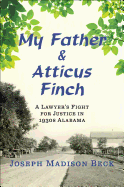
In 1938, a black man was charged with raping a white woman in Troy, Ala. The Scottsboro cases were still fresh in the minds of judges and lawyers everywhere. Foster Beck, a respected attorney in Enterprise, Ala., received a phone call from Judge W.L. Parks requesting that he represent the accused in what would become the highly publicized State of Alabama v. Charles White, Alias. Joseph Madison Beck, Foster Beck's son, uses oral family history, newspaper reports, transcripts from the trial and the Alabama Supreme Court decision to reconstruct his father's determined defense, which includes many parallels to the rape case in Harper Lee's To Kill a Mockingbird.
Though the author's style of switching between a first-person narrator and an omniscient narrator disrupts the flow of My Father and Atticus Finch, the portrayal of his father's optimism and faith in a system staunchly resistant to change shines a glaring spotlight on the lengths people will go in order to justify bias. Foster Beck's father warns him, "You can't enforce a law that's crossways with what a jury will support."
Atticus Finch would never win Tom Robinson's case, and he knew that. Foster Beck would never win Charles White's case but, like Jem Finch, he overestimated the jury's neutrality. The two men share many characteristics but have plenty of differences as well. While this case may or may not have subconsciously influenced Harper Lee, Foster Beck's story is one worth knowing and full of lessons valuable three quarters of a century later. --Jen Forbus of Jen's Book Thoughts

